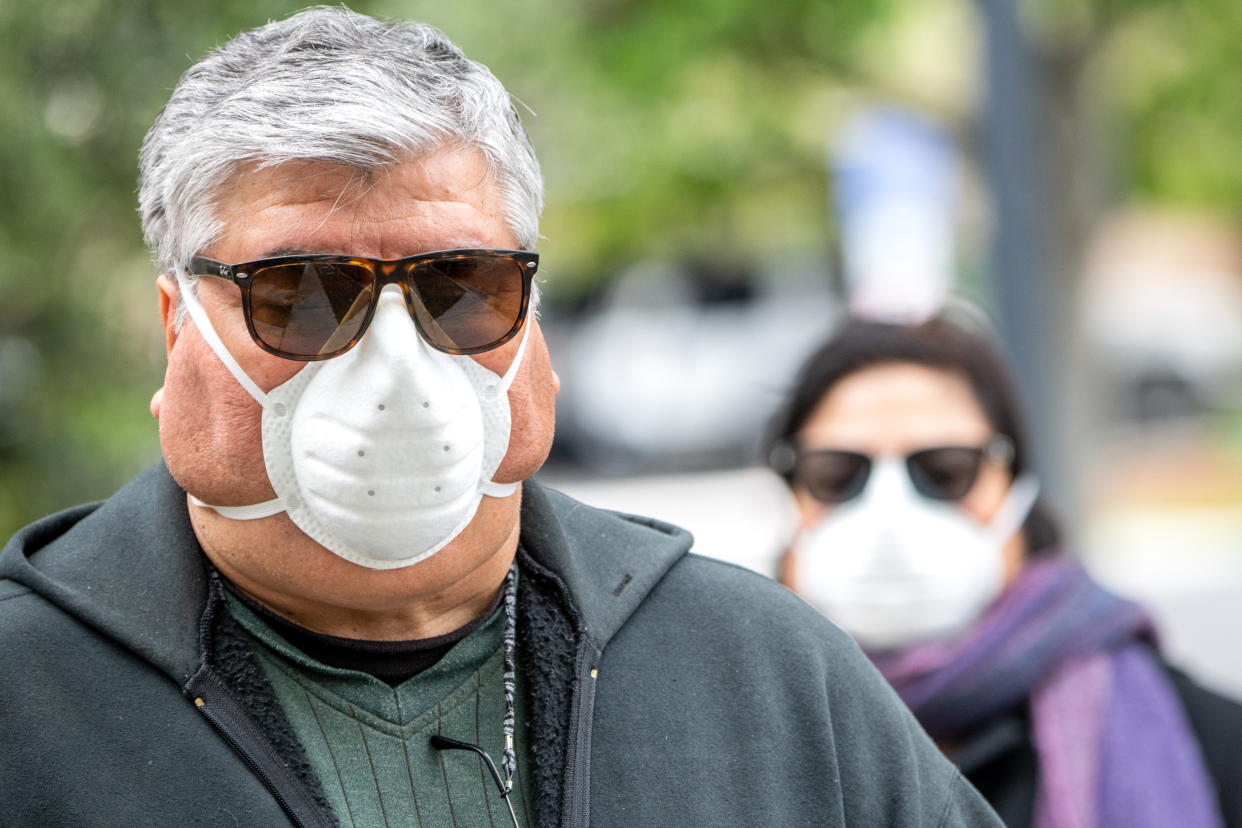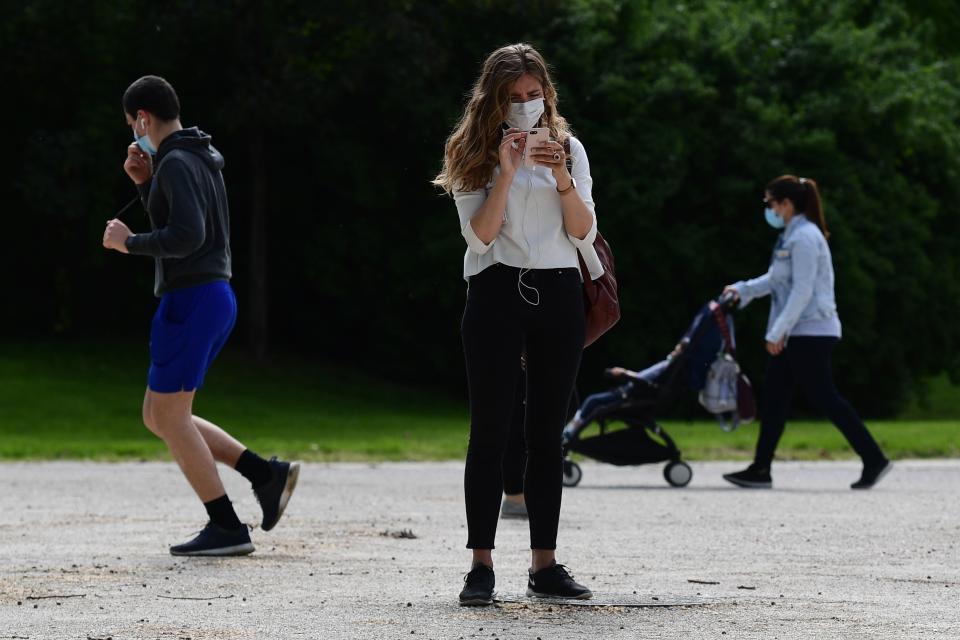Coronavirus: Why are obese people more at risk?

Obesity has been highlighted as one of the biggest risk factors for complications amid the coronavirus outbreak.
In the largest study in Europe so far, data from more than 16,000 patients across 166 UK hospitals revealed carrying a dangerous amount of weight, old age and being male all raise the risk of dying with the infection.
The US Centers for Disease Control and Prevention reported that out of around 180 adults hospitalised with the coronavirus, 89% had at least one underlying condition, with obesity being the most common for those between 18 and 64.
Just under a third (29%) of UK adults were classified as obese in 2019. In the US, 42% of people of all ages carried a dangerous amount of weight in 2017/18.
Early research suggests the coronavirus is mild in four out of five cases, however, it can trigger a respiratory disease called COVID-19.

Coronavirus: ‘Immune response’ may be ‘ineffective in obese individuals’
The coronavirus is thought to have emerged at a seafood and live animal market in the Chinese city Wuhan, capital of Hubei province, at the end of 2019.
Only the relatively small number of people worldwide who have encountered the infection are said to be immune to it.
While anyone can catch the coronavirus, complications and fatalities seem to be disproportionately high among the obese.
Latest coronavirus news, updates and advice
Live: Follow all the latest updates from the UK and around the world
Fact-checker: The number of COVID-19 cases in your local area
Explained: Symptoms, latest advice and how it compares to the flu
Carrying too much weight can also lead to metabolic syndrome; a cluster of conditions that raise the risk of type 2 diabetes, stroke and heart disease.
These conditions include high blood pressure, excess fat around the waist and elevated “bad” cholesterol.
Writing in the journal Nature Reviews Endocrinology, scientists from University Hospital Carl Gustav Carus in Germany said “patients with [type 2 diabetes] and metabolic syndrome might have up to 10-times greater risk of death when they contract COVID-19”.
Statistics show the vast majority of the deaths worldwide are in the elderly or those with pre-existing health conditions.
Even after adjusting for other medical problems, the UK hospital study found being obese was a significant risk factor for death.
“This may be because as your infection progresses and the virus infects more and more cells, the demand for oxygen in the tissues is much higher for an obese individual than it is for a lean individual,” said Dr Dyan Sellayah from the University of Reading.
“Eventually the obese body becomes overwhelmed by the lack of oxygen getting to the major organs.”
Although usually mild, the coronavirus can spread from the airways to the alveoli (air sacs) in the lungs, where gas exchange takes place.
The air sacs then become inflamed and filled with fluid or pus.
As the lungs struggle to draw in air, oxygen levels in the blood fall and carbon dioxide accumulates.
Obese people having a “higher metabolic demand” may not tell the full story, however.
“Obese people tend to have dysfunctional immune systems; their fat tissue for example becomes a reservoir for immune cells known as macrophages,” said Dr Sellayah.
“While these cells reside in our fat under normal circumstances, in obesity they are at higher frequency and become more troublesome.
“They start to secrete inflammatory cytokines [immune-fighting proteins], and negatively impact on immune and metabolic health.
“It is likely the immune response to the virus is therefore ineffective in obese individuals”.
Cytokines are released to help regulate immunity. Excessive amounts can lead to a “cytokine storm”, which triggers hyper-inflammation.
Obese people may also have reduced lung function, making it harder to draw in oxygen.
While the coronavirus is relatively new, excess weight has been shown to be dangerous with flu.
In 2009, 61% of the people hospitalised with swine flu in California who later died from the infection were obese.
Obese adults have also been found to “carry” flu viruses for 42% longer than their slimmer counterparts.

Can obesity be tackled amid the coronavirus pandemic?
According to the cardiologist Dr Aseem Malhotra, the “root of it all is poor diet”.
“If you have a poor diet [and] excess body fat, you have chronic inflammation in the body; it’s under stress and being damaged,” he said.
Speaking on BBC Sounds, he specifically blamed ultra-processed food, which reportedly makes up around half of the average person’s daily calorie intake.
“If it comes out of a packet and it has five or more ingredients, it’s ultra processed,” said Dr Malhotra.
While combating the obesity problem amid a pandemic may seem unrealistic, the medic claimed dietary tweaks can bring about results surprisingly quickly.
Dr Malhotra claimed some of his patients have reversed their type 2 diabetes in just 21 days following years of medication.
“If everyone [cut out ultra-processed food] just for a month, up to 50% of people could send their type 2 diabetes into remission and would be in a much better state to deal with COVID-19”, he said.
Dr Malhotra recommended cutting back on sugar and starchy carbohydrates, like rice, pasta, bread and potatoes.
Instead, he advised our diets be made up of vegetables, whole fruit, oily fish, meat, dairy and nuts.
This slightly contradicts the NHS Eat Well recommendations, which encourage five portions of fruit or vegetables a day, but also states meals should be based on “higher fibre starchy foods”.
While junk food has become “normalised”, Dr Malhotra stressed it is addictive and does not satisfy hunger.
Many claim fresh food is inexpensive, however, the medic stressed “an apple costs less than a chocolate bar”.

What is the coronavirus?
The coronavirus is one of seven strains of a virus class that are known to infect humans.
Others cause everything from the common cold to severe acute respiratory syndrome (Sars), which killed 774 people during its 2002/3 outbreak.
Since the outbreak was identified, more than 3.5 million cases have been confirmed worldwide, according to Johns Hopkins University.
Of these cases, over 1.1 million are known to have “recovered”.
Globally, the death toll has exceeded 247,600.
The coronavirus mainly spreads face to face via infected droplets expelled in a cough or sneeze.
There is also evidence it is transmitted in faeces and survives on surfaces.
The coronavirus has no “set” treatment, with most patients naturally fighting off the infection.
Those requiring hospitalisation are given “supportive care”, like ventilation, while their immune system gets to work.
Officials have urged people to ward off infection by washing their hands regularly and maintaining social distancing.




